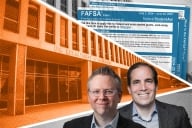You have /5 articles left.
Sign up for a free account or log in.
In 2010, when Campus Pride urged the Common Application to add optional questions about gender identity and sexual orientation, the idea was novel. No colleges at that time included such questions, and early in 2011, the Common Application rejected the proposal.
But in August 2011, Elmhurst College became the first college to add such questions and others have followed. Among them are such large and prominent institutions as Duke University, Massachusetts Institute of Technology and the University of Iowa. With the University of California system adding the question this year, a huge applicant pool will face the questions -- optional as they are at all institutions that have adopted them.
When the Common Application rejected the idea in 2011, a statement from the organization said that it might review the concept "later this decade," based, among other things, on "evolving cultural norms."
On Friday, 25 organizations that are advocates for gay and lesbian and transgender students, or are civil rights organizations, sent a joint letter to the Common Application saying that it's time for the organization to add the questions. The letter notes that many more students want to answer those questions and may not identify with the standard male/female distinction traditionally found on applications. With hundreds of colleges using the Common Application, organizers of the letter see it as key to their view that applicants should have the option of answering these questions.
The letter cites several reasons. "More and more LGBTQ students are living openly when they apply to college and want to be able to self-identify -- just as they do with their race, ethnicity, and religion. The questions that we are proposing on gender identity and sexual orientation would be optional, so that LGBTQ students who are not living openly or not comfortable disclosing do not have to do so," the letter says.
Further, the letter states that "a growing number of colleges and universities are seeking to track data related to openly LGBTQ students applying, being accepted, and enrolling in their institutions. The lack of questions on LGBTQ identity on the Common Application makes obtaining this data more difficult, which hinders the ability to address their academic retention and success."
The letter says that this tracking is needed because "LGBTQ youth, specifically LGBQ youth of color and transgender youth of all races, experience multiple oppressions and are much more likely than other students to struggle academically and personally in college. In order to positively impact their college experience, institutions must have the ability to identify these students."
The signatories to the letter include Campus Pride and the Consortium of Higher Education LGBT Resource Professionals, which tried to get the Common Application to change five years ago, and many other groups. They include such prominent gay rights organizations as the Human Rights Campaign, GLAAD and the Point Foundation, and other groups, such as the Japanese American Citizens League and ACPA: College Student Educators International.
Aba Blankson, a spokeswoman for the Common Application, said that she did not think of the 2011 decision as a rejection of the idea, because of the view expressed at that time that attitudes might evolve. "As a member association, we take our cue from the colleges and universities in our membership – and this is a topic that we have been and continue to discuss," she said via email. "As the national conversations move forward, we will continue the discussions to determine how the colleges and universities in our membership would like gender and identity reflected in the shared portion of the Common App. I am confident that we will handle in the most progressive manner possible."
When the Common Application rejected the idea in 2011, organization leaders noted that students involved in gay-rights activism could list that among activities in which they participated, although others quickly noted that that many high school students who join groups to promote gay rights at their schools are straight.
The 2011 statement also said that "many admission officers and secondary school counselors expressed concern regarding how this question might be perceived by students, even though it would be optional. One common worry was that any potential benefits to adding the question would be outweighed by the anxiety and uncertainty students may experience when deciding if and how they should answer it."
Privately, some admissions deans at the time of the 2011 discussion also said that the diversity of Common Application colleges complicated the issue. Among the members are many institutions that have large and active gay student groups, and where campus leaders speak out in support of gay rights. Other Common Application colleges, however, are religious colleges affiliated with faiths that have a range of views (some not supportive) about gay people.








